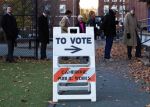 American electorate was deeply divided ideologically and exceedingly polarised in their political beliefs in the just concluded presidential election, according to an exit poll on Wednesday.
American electorate was deeply divided ideologically and exceedingly polarised in their political beliefs in the just concluded presidential election, according to an exit poll on Wednesday.
The deep ideological divide was reflected in the way Americans voted in the 2012 presidential election, in which incumbent Barack Obama defeated his Republican challenger Mitt Romney in one of the fiercely fought polls in US history.
Forty-nine per cent of voters in the CBS exit poll want all or part of the 2010 health care law repealed, and 83 per cent of them voted for Romney. 44 per cent want the health care law left as is or expanded, and 87 per cent of them voted for the president.
This ideological division extends to beliefs about the US economic system. Fifty-five per cent of voters believe that the economic system favours the wealthy; 71 per cent of them voted for Obama. Thirty-nine per cent said that the economic system if fair to most Americans and three-quarters of these voters supported Romney.
It's not just economic issues that divide the American public. Those surveyed in the poll split almost evenly when asked if they want their state to legally recognise same-sex marriage: 49 per cent said yes and 46 per cent said no.
Obama received almost three-quarters of the votes of those who favour same-sex marriage, and Romney won the same fraction of those opposed. Almost eight in 10 whites who call themselves evangelical or born-again voted for Romney.
There were also deep geographic differences evident in support for Obama and his opponent. Obama won 70 per cent of voters living in big cities in the US, while Romney got 58 per cent of those living in small cities and rural areas.
Both the Obama and Romney campaigns fought hard for the women's vote this year. Yet one of the key stories to emerge from the CBS Exit poll is that women are not one monolithic voting block.
Obama's support among women becomes clearer when you consider gender and marital status. While non-married women are overwhelmingly supportive of the president, 67 to 31 per cent, married women favour Romney by a 10 point margin (54 to 45 per cent). A similar pattern emerges when gender is considered along with race. Whereas Obama enjoyed overwhelming support among black and Latino women, white women supported Romney, 56-42 per cent.
In addition to non-married women, other key components of Obama's constituency were young people, racial and ethnic minorities. These are the same groups that made up much of Obama's voting block four years ago.
In 2008, for instance, 66 per cent of young people age 18-29 supported the president, just six percentage points more than this year. Similarly, in 2008, 95 per cent of blacks supported Obama, compared to 93 per cent this election cycle.
This pattern is repeated among Hispanics, who in 2008 supported Obama over John McCain 67-31 per cent and this year came out in even larger numbers, 69 to 30 per cent.











 © 2025
© 2025